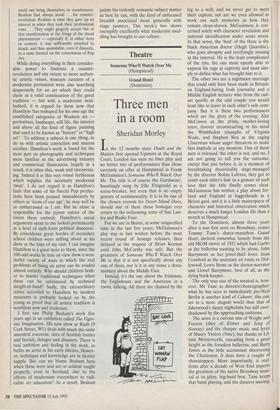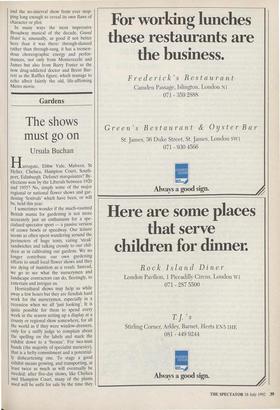Theatre
Someone Who'll Watch Over Me (Hampstead)
Grand Hotel (Dominion)
Three men in a room
Sheridan Morley
In the 12 months since Death and the Maiden first opened Upstairs at the Royal Court, London has seen no finer play and no better trio of performances than those currently on offer at Hampstead in Frank McGuinness's Someone Who'll Watch Over Me. The title is of course the Gershwins', hauntingly sung by Ella Fitzgerald as a scene-breaker, but even that is no empty gesture of sentimentality. It is to be one of the chosen records for Desert Island Discs, should one of these three hostages ever return to the welcoming arms of Sue Law- ley and Radio Four.
For we are in Beirut, at some unspecified time in the last five years; McGuinness's play was in fact written before the most recent round of hostage releases, then delayed at the request of Brian Keenan until John McCarthy was safe. But the greatness of Someone Who'll Watch Over Me is that it is not specifically about any one of them, nor is it in any sense a docu- mentary about the Middle East.
Instead, it's the one about the Irishman, the Englishman and the American in a room, talking. All three are chained by the leg to a wall, and we never get to meet their captors; nor are we even allowed to work out such mysteries as how they remain clean-shaven. McGuinness is con- cerned solely with character revelation and national identification under acute stress. In that sense, the 'best' of the three is the black American doctor (Hugh Quarshie), who goes abruptly and terrifyingly missing at the interval. He is the least complicated of the trio, the one most openly able to express his rage at captivity and most sim- ply to define what has brought him to it.
The other two are a nightmare marriage that could only have been made in Britain: an England-hating Irish journalist and a Middle English lecturer who from the out- set qualify as the odd couple you would least like to leave in each other's sole com- pany. But it is these two performances which are the glory of the evening: Alec McCowen as the prissy, mother-loving tutor, forever reconstructing in his mind the Wimbledon triumphs of Virginia Wade, and Stephen Rea as the raging Ulsterman whose anger threatens to make him implode at any moment. One of these men is released, the other is not, and no, I am not going to tell you the outcome; except that just before it, in a moment of breathtaking theatricality stage-managed by the director Robin Lefevre, they get to comb each other's hair in a gesture of such love that the title finally comes clear. McGuinness has written a play about Ire- land and England at loggerheads in a Beirut gaol, and it is a little masterpiece of character and historical observation which deserves a much longer London life than a month at Hampstead.
To the Dominion, almost three years after it was first seen on Broadway, comes Tommy Tune's dance-marathon Grand Hotel, derived somewhat loosely from the old MGM movie of 1932 which had Garbo as the ballerina wanting to be alone, John Barrymore as her jewel-thief lover, Joan Crawford as the secretary en route to Hol- lywood, Lewis Stone as the doctor-narrator and Lionel Barrymore, best of all, as the dying book-keeper.
The only true star of the musical is, how- ever, Mr Tune as director/choreographer: what he has seen in immediately pre-Nazi Berlin is another kind of Cabaret, this one set in a more elegant world than that of Isherwood's sleazy nightclubs but still over- shadowed by the approaching uniforms. The score is a curious mix of Wright and Forrest (they of Kismet and Song of Norway) and the sharper music and lyrics of Maury Yeston (Nine), but thanks to Lil- lane Montevecchi, cascading from a great height as the forsaken ballerina, and BarrY James as the little accountant discovering the Charleston, it does have a couple of showstoppers. More importantly, it reaf- firms after a decade of West End imports the greatness of the native Broadway musi- cal at its glitzy, big-band best. Tune keeps that band playing, and the dancers moving,
and the no-interval show from ever stop- ping long enough to reveal its own flaws of character or plot.
In many ways the most impressive Broadway musical of the decade, Grand Hotel is, unusually, as good if not better here than it was there: through-danced rather than through-sung, it has a tremen- dous choreographic energy and perfor- mances, not only from Montevecchi and James but also from Barry Foster as the now drug-addicted doctor and Brent Bar- rett as the Raffles figure, which manage to echo albeit faintly the old, life-affirming Metro movie.



















































 Previous page
Previous page